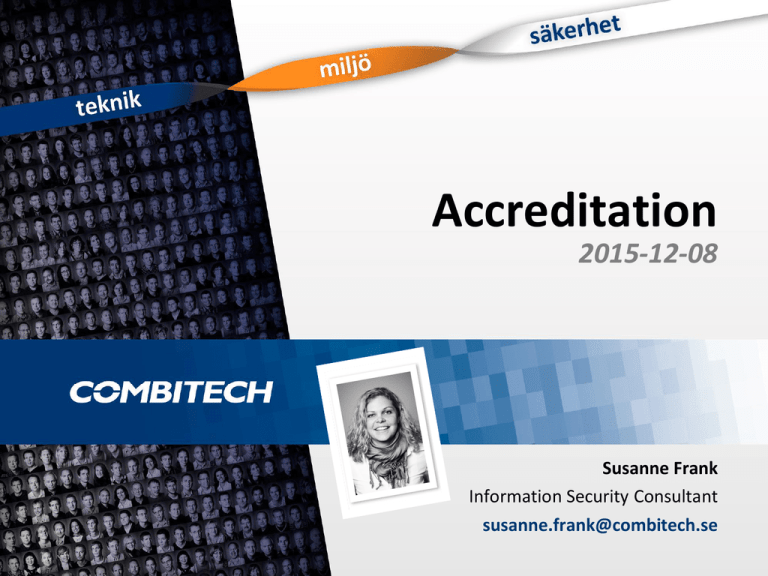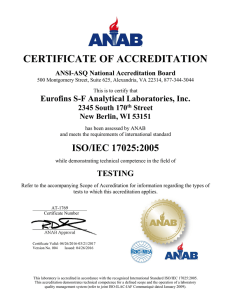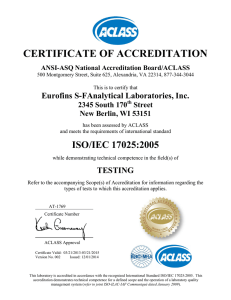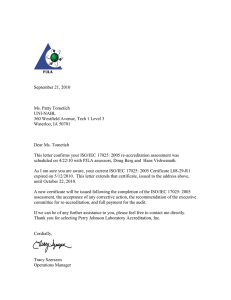Accreditation 2015-12-08 Susanne Frank Information Security Consultant
advertisement

Accreditation 2015-12-08 Susanne Frank Information Security Consultant susanne.frank@combitech.se Agenda § My background § Why accreditation § Basics of the Accreditation method § Standards § System Development Lifecycle § Step by step § Difficulties § Example – Smart phone § Cyber Security - New Challenges Definition § Formal approval with regards to Information Security to go in to operation – Operation Authorization Why accreditation? § To ensure Information Security is handled in the system § To do the right thing from the beginning - Information Security shall be a part of system development from the beginning to accomplish cost effectiveness § It will be a better system in the end in the aspect of security, usability and technology § Coordination of IT-systems in the organization § Enhanced documentation of the system § Record of approved applications and systems in the organization § Standardized method in large organizations § CC is used for products – Accreditation is used for systems Priorities Protect the critical information Technique and organisation Correct protection for correct information Prepare for when something happens Method, Swedish Armed Forces ISO/IEC 12207 ISO/IEC 15288 DIT 04 § ISO/IEC 12207 Systems and software engineering — Software life cycle processes § ISO/IEC 15288 Systems Engineering standard covering processes and life cycle stages § DIT 04 Directives for the Swedish Armed Forces Information Technology Method, Saab ISO/IEC 12207 PROPS ISO/IEC 15288 SAAB Accreditation Method System Development Lifecycle Phase out Security Objective Order Operation Specify IT Security Architecture Implementation Systemize Tests Develop Evaluation Security Objective Threat requirements Legal requirements Compiles all requirements in one security objective, this includes: Operational requirements Information requirements • Identify and handle contrarious requirements • Order requirements by shall and should • Identify requirements by technical and administrative Security Objective A compilation of all security related requirements – independent of the source Security Objective, Method Operational requirements Legal requirements Operational analysis Information analysis Information requirements Threat and risk analysis Threat requirements Security Architecture Security Objective IT Security Architecture Design suggestion The Security architecture is based on the security objective along with the design suggestion in order to describe how security shall be attained in the system. Develop Ensure that decided functions and solutions are implemented. Plan Handle modified requirements and conditions • Plan – what functions and solutions shall be implemented? Test Develop • Develop– how shall the functions be realized? • Test – validate desired functionality Evaluation Can be performed during different stages in the project. Several types, depending on requests. Accreditation Technical evaluation/ Penetratio n tests Assessment/ Evaluation Code review Validation and verification Difficulties § Project Management sees cost, not profit § Information security is generally applied late or afterwards § Documentation is inadequate - Security functions are rarely described thoroughly in system documentation § “System of systems” depending on other systems or components being accredited already § Contradictive security objectives Example - Smart phone Assessment/Evaluation § Technical Evaluation/Penetration test § Code review § Validation and verification Security Objective Operational requirements Legal requirements Operational analysis Information analysis Information requirements Threat and risk analysis Threat requirements Camera: SMS/MMS: WIFI: I want to be able to take photos and store a lot of photos I want to be able to send texts including pictures. I want WIFI Contacts: Calendar: E-mail: I want both my private calendar and work calendar. I want to be able to send both private and company e-mails GPS: I want Facebook and google maps to know my position I want both customers, family and friends in my contacts The calendar shall synchronize automatically. APP: Internet: I want Facebook, Instagram, LinkedIn. I want to be able to connect to Internet. Security Objective Operational requirements Legal requirements Operational analysis Information analysis Information requirements Threat and risk analysis Threat requirements Photos: SMS/MMS: WIFI: Whiteboard from job meeting Here is your password… Net and password Embarrassing photo from Saturday night party… I’ll be away on a trip all of next week… Contacts: Customers E-mail: Calendar: Log in information… Away… Family, friends Tickets… Social media: GPS History Family, friends Internet: Phone log: Customers Pictures, status updates… Web history Location Favorites Security Objective Operational requirements Legal requirements Operational analysis Information analysis Information requirements Threat and risk analysis Threat requirements SMS/MMS: E-mail Text in your name to customers/friends Send e-mails in your name Phone App Call in your name Control your online characters Train-tickets Social media: Spend money on online games Facebook posts/Instagram in your/the company’s name Settings on Spotify/Netflix/Skype Twitter in your/the company’s name What differs a smart phone from a laptop? § You often use it both for work and in your spare time § Different focus on protection § Easier to carry § Easier to loose, easier to steel § More opportunities to surf on unprotected WiFi networks § Many more and easy to get applications § Children and friends use it for games, films and music Suggested requirements § § § § § § Use password (not just the SIM-code) Encrypt the content, if possible Control app permissions Always use HTTPS Avoid unencrypted/unsecure networks Install updates Suggested requirements § § § § § § § No root or jailbreak Contact information outside of the locked content Backup No unknown chargers/cables Turn off interfaces that is not needed Be aware that photos may contain time and position Reset old mobile phones, in combination with encryption Security functions § Access control (user name, password, certificates, etc.) § Logging of security related events (log in, configuration changes, access of information etc.) § Protection of stored information (checksums, encryption, key handling, revocation, etc.) § Redundancy § Intrusion detection/prevention (firewalls, IDS/IPS, etc.) § Protection of information in transmission (HTTPS, VPN, TLS, i.e. encryption) § Protection against malware (virus, worms, trojans, etc.) Evaluation Validation and verification Technical evaluation /Penetrati on tests Assessment/ Evaluation Accreditation Code review


